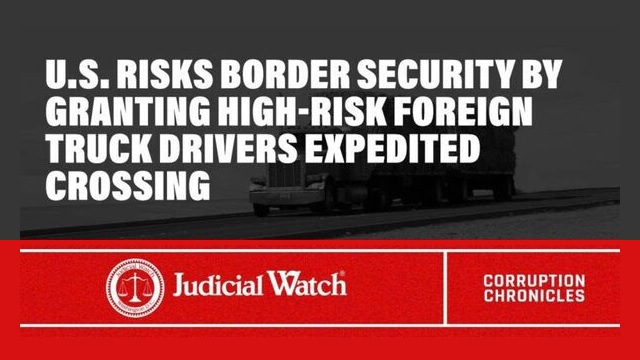U.S. Risks Border Security by Granting High-Risk Foreign Truck Drivers Expedited Crossing

The Homeland Security agency charged with safeguarding America’s borders clears high-risk foreign truck drivers for expedited crossing under a free-trade agreement created to facilitate commercial traffic between Canada, Mexico, and the U.S., according to a federal probe that concludes the failure is “increasing border security risk.” The troubling details are outlined in a 34-page report, issued by the Department of Homeland Security Inspector General with redactions to protect delicate information embedded in the original “law enforcement sensitive” version. The modified public document is distressing enough, even with the blacked-out nuggets involving candidates who do not qualify for the program but are nevertheless approved by Customs and Border Protection (CBP), the 60,000-employee agency created after 9/11 to protect the country from terrorists, narcotics, and illegal immigrants.
The “commercial clearance” program is knowns as Free and Secure Trade (FAST) and participants who meet certain eligibility criteria and are considered low risk after a thorough security check, receive expedited border processing between Mexico, the U.S. and Canada. Proper vetting is essential and must assure there is no risk in letting the individual travel freely in and out of the country with cargo. The goal is to ensure security and safety of inter border commerce while enhancing the economic prosperity of each country. Ideally, this enables CBP to focus security efforts and inspections on commerce that is “high or unknown risk” while ensuring the flow of legitimate, “low-risk commerce.” The reality is that CBP is failing miserably to properly screen drivers, federal auditors found, writing that “without an effective means to evaluate the program’s impact on border security, CBP may be exposing its land ports of entry to heightened threats.”
Due to the agency’s “inadequate policies and procedures” drivers who should not have qualified for FAST clearance were allowed to participate, the probe found. Investigators examined 8,859 active drivers during fiscal year 2019 and determined that 1,084 were ineligible and therefore “increasing border security risk.” Making matters worse, CBP approved 94% of foreign drivers with “potentially disqualifying records,” the report says. In those cases, federal agents failed to conduct full background checks because the U.S. government evidently does not have access to the necessary foreign databases. The exact information is redacted but the report makes clear that the records required to properly vet foreign nationals—specifically Mexican citizens—is not available to CBP officers and they “need access” to complete the appropriate security process to authenticate drivers as low risk.
But even when the criminal history of a candidate is stored in the U.S. by another federal law enforcement agency, CBP apparently cannot access it. Instead of rejecting the foreign driver in question out of an abundance of caution, the agency simply rubber-stamps the candidate without adequate screening. To illustrate this incredible, but very common, lack of cooperation within American law enforcement agencies, the IG offers the case of two Mexican nationals determined to be “ineligible.” Both were approved for FAST despite having extensive FBI files in addition to what redacted portions seem to indicate substantial criminal histories in Mexico. But evidently CBP and the FBI don’t share information. “FBI records did not allow Enrollment Center officers to assess the drivers’ risk prior to approving their participation in the program,” the report states. So, what is the critical agency charged with safeguarding the nation’s famously porous borders to do? Wave the foreign drivers through as low risk without vetting them.
As unbelievable as this may sound, it has been going on for years. FAST has long been plagued by serious security lapses. In fact, nearly a decade ago a DHS IG investigation found that drivers with terrorism and drug-smuggling ties were authorized by CBP for the program’s expedited border crossing. More than 80,100 drivers participated in FAST during the year examined by the IG, 70,000 along the U.S.-Canada border and over 11,500 along the U.S.-Mexico border. Investigators found that at least half a dozen drivers cleared by CBP had deep connections to terrorism and drug smuggling operations. It gets scarier; it took federal officials five years to realize it! At least two dozen others had criminal, immigration, or agricultural violations. In warning CBP about the dangers of its security lapses, the DHS watchdog pointed out in that report that the benefits granted to FAST participants “make the program attractive to drug smugglers.” That was 2012 and it seems like little has changed after nearly a decade.
EDITORS NOTE: This Judicial Watch column is republished with permission. ©All rights reserved.


Leave a Reply
Want to join the discussion?Feel free to contribute!